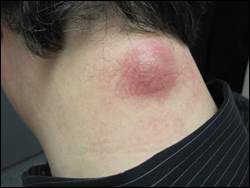
Epidermoid cysts (epidermal inclusion cyst) are small lumps, which are hard. They develop under the skin (ectodermal tissue).
Epidermoid cyst is also popular by other names like keratin cysts, epithelial cysts, infundibular cyst (as in most of the cases, the site of origin is the infundibulum of the hair follicle) and sebaceous cysts. In an epidermoid cyst, there is implantation of epidermal elements to dermis. Hence more specifically, it is termed as epidermal inclusion cyst.
These are slow growing cysts and do not shows up any other symptoms. It is very common irrespective of age, sex and race. Epidermoid cysts are very benign and never ever cancerous.
The average size range of the cyst is ¼ inch to 2 inches.
Commonly found body parts – head, face, neck, back and genitals (places where there is relatively less hair)
Color – tan to yellow color
Characteristics – filled with odorous thick pus, central opening of the cyst is usually covered with a black head.
Histology – it is an accumulation of thin layer of squamous epithelium.
Epidermoid cysts are painless cysts and usually require no treatment.
But if the cyst gets infected, urgent medical attention is needed. Infected epidermoid cysts are swollen, red and tender.
Please don’t squeeze out the contents of cyst, as it may lead to infection or ant serious complications.
Keratin is a protein, which occurs naturally in the skin cells. When this keratin builds up in the skin, it leads to a disruption in skin or hair follicle and thus causes the formation of epidermoid cyst. The triggering factors of an epidermoid cyst formation includes:-
- Acne and other similar skin condition
- Skin injury or trauma
- Body piercing especially cheek piercing (as there is an interruption of salivary ducts)
- Surgery
- HPV infection
- Excessive exposure to the sun
HERBAL REMEDIES FOR EPIDERMOID CYST
In most of the cases, epidermoid cyst subsides itself and may not cause any other serious complications. But immediate care should be taken, if the cyst gets infected or if the characteristics and size of the cyst changes abnormally. Antibiotic therapy and drainage is most common treatment options in Allopathic medicine. Planet Ayurveda offers certain potent herbal remedies for epidermoid cyst. These are 100% natural and free from side effects.
- Kanchnaar Guggul
- Navakarshik churna
- Arogayavardhni vati
- Erand oil
1. Kanchnaar Guggul
It is a potent anti inflammatory herbal formulation. Kanchnaar guggul is enriched with numerous antioxidants and possess anti microbial activity. It is also known to be an excellent anti mutagenic. Kanchnaar guggul is empowered to pacify all the three aggravated doshas – vata, pitta & kapha. It is an excellent choice of medicine for treating skin diseases, liver cysts, and fistulas and also good to use in tumors, lymphoma etc. The ingredients of this formulation include:-
- Bark of Kanchnaar (Bauhinia variegata)
- Amalaki (Emblica officinalis)
- Haritaki (Terminalia chebula)
- Bibhitaki (Terminalia bellerica)
- Ginger (Zingiber officinale)
- Black pepper (Piper nigrum)
- Pippali (Piper longum)
- Varuna (Crataeva religiosa)
Dosage – 2 tablets twice or thrice a day with lukewarm water after meals.
2. Navkarshik Churna
It is a very effective blood purifier. It corrects the protein metabolism and cleanses the blood. It is very effective for pain management in arthritic condition. It contains nine ingredients, each taken in karsha pramana (12 gms). The ingredients are amalaki (emblica officianalis), haritaki (terminalia chebula), vibhitaki (terminalia bellerica), neem (azadirachta indica), vacha (acorus calamus), manjishta (rubia cordifolia), katuki (piccorrhiza kurrao), guduci (tinospora cordifolia), daruharidra (berberis aristate). It balances the tridoshas predominantly vata & pitta. It is an immune enhancer and protects the liver health. Skin tone and complexion can be improved by navkarshik churna.
Dosage – 1 tsp of choorna twice daily after meals with lukewarm water.
3. Arogayavardhni Vati
It is classic Ayurvedic formulation aimed at improving the overall health.
Ingredients of arogayavardhni vati:-
- Loha bhasma – calcined iron
- Shudha parada – purified mercury
- Shudha gandhaka – purified sulphur
- Katuki – piccorhiza kurroa
- Castor – ricinus communis
- Shudha guggul – commiphora mukul
- Shudha shilajatu
- Amalaki – emblica officianalis
- Vibheetaki – terminalia bellerica
- Hareetaki – terminalia chebula
- Abhraka bhasma – calcined mica
- Neem juice – azadiracta indica
Arogayavardhni vati helps to expel the excess fat in the body. It is an excellent formulation to control the hormonal level in both boys and girls. It is a great immune modulator. It also has anti microbial activity. Tridosha can be well maintained using arogayavardhni vati.
Dosage – 2 tablets twice daily after meals with lukewarm water.
4. Erand Oil
Erand thaila is prepared out of the roots of erand (ricinus communis – castor). Even though it is used to balance tridosha, its talent is well noted while treating vatika disorders. Its daily application builds up healthy muscles and joints. Boils, furuncles, worm infestation and other skin conditions are well cured using errand oil. Erand thaila is also beneficial in arthritis, facial palsy, and urinary infections and in hair growth. The excellence of erand thaila can be noted in pain management.
Dosage – For external application.

No comments:
Post a Comment